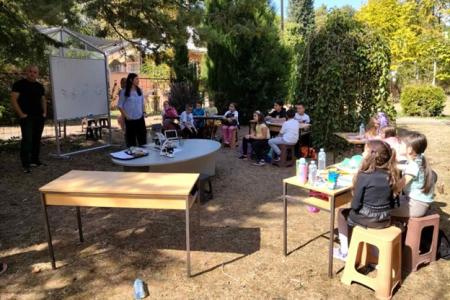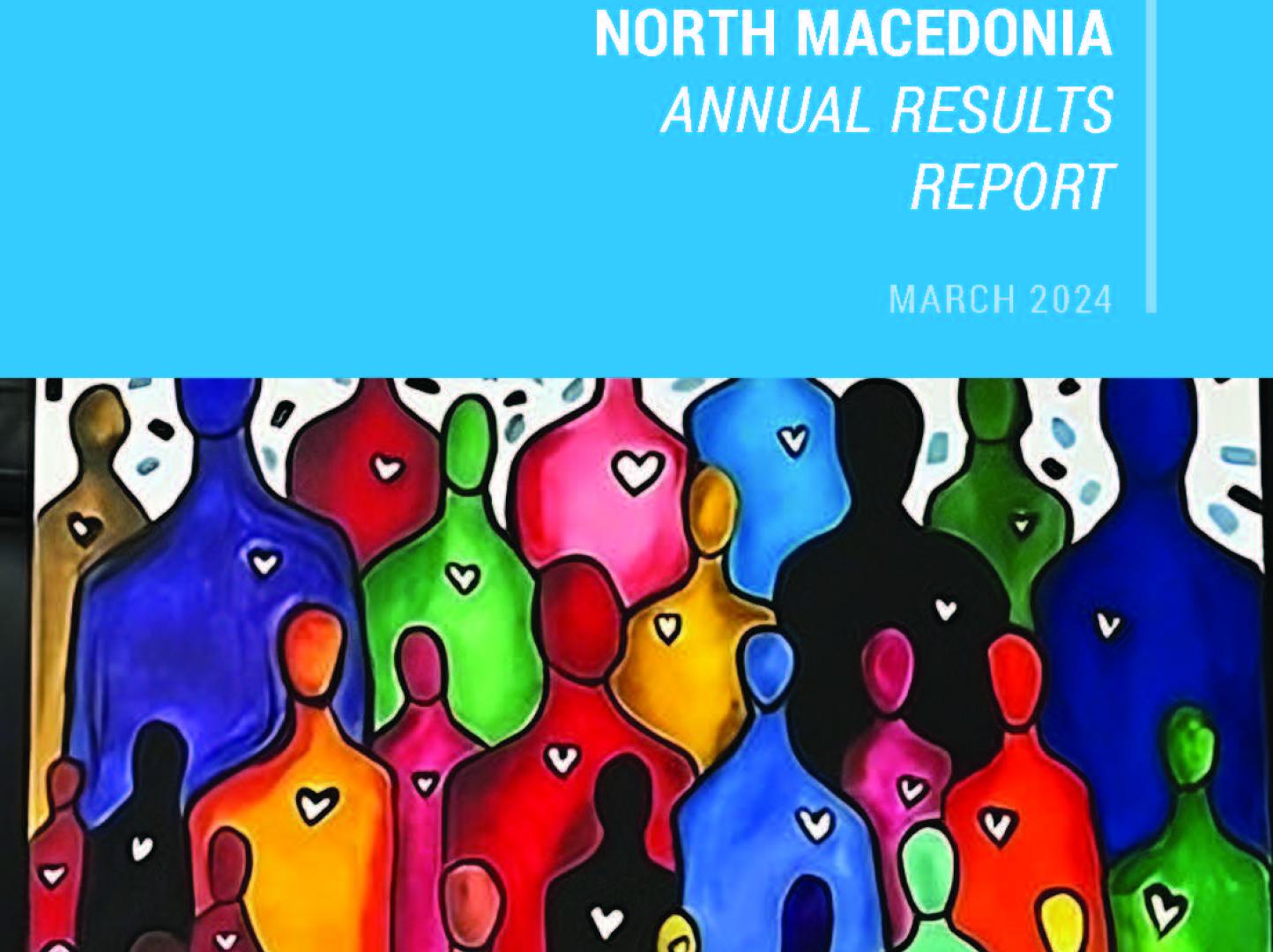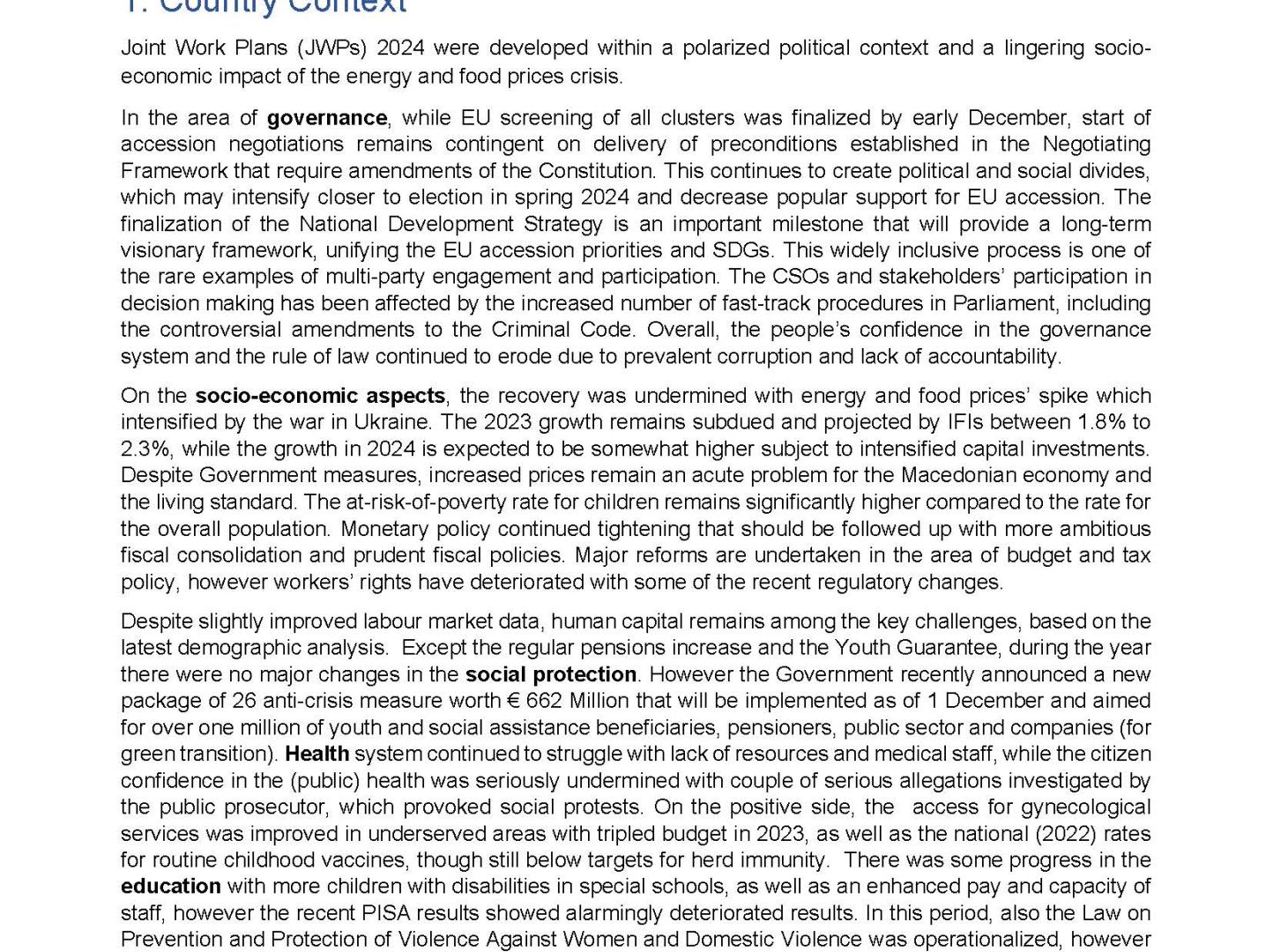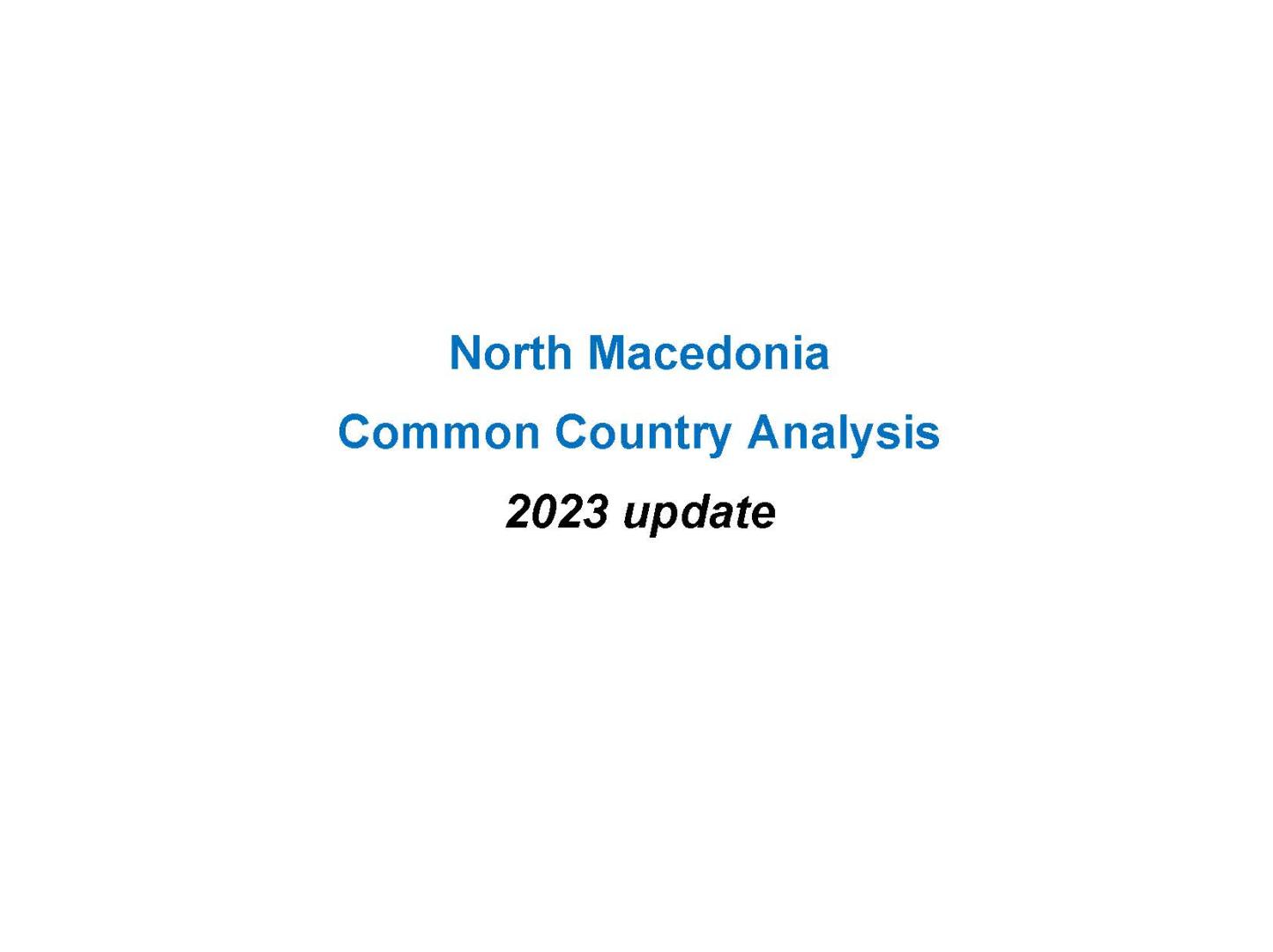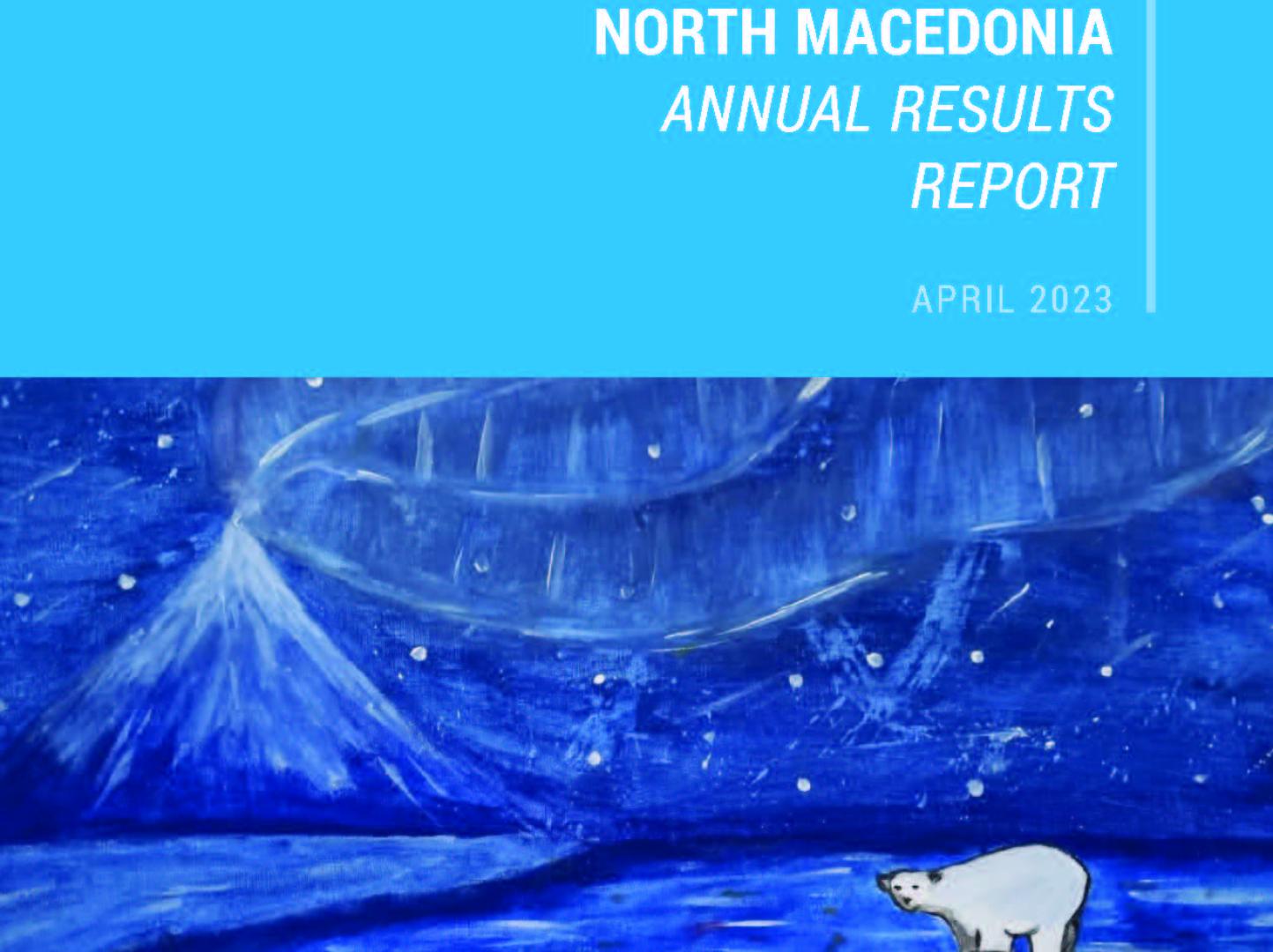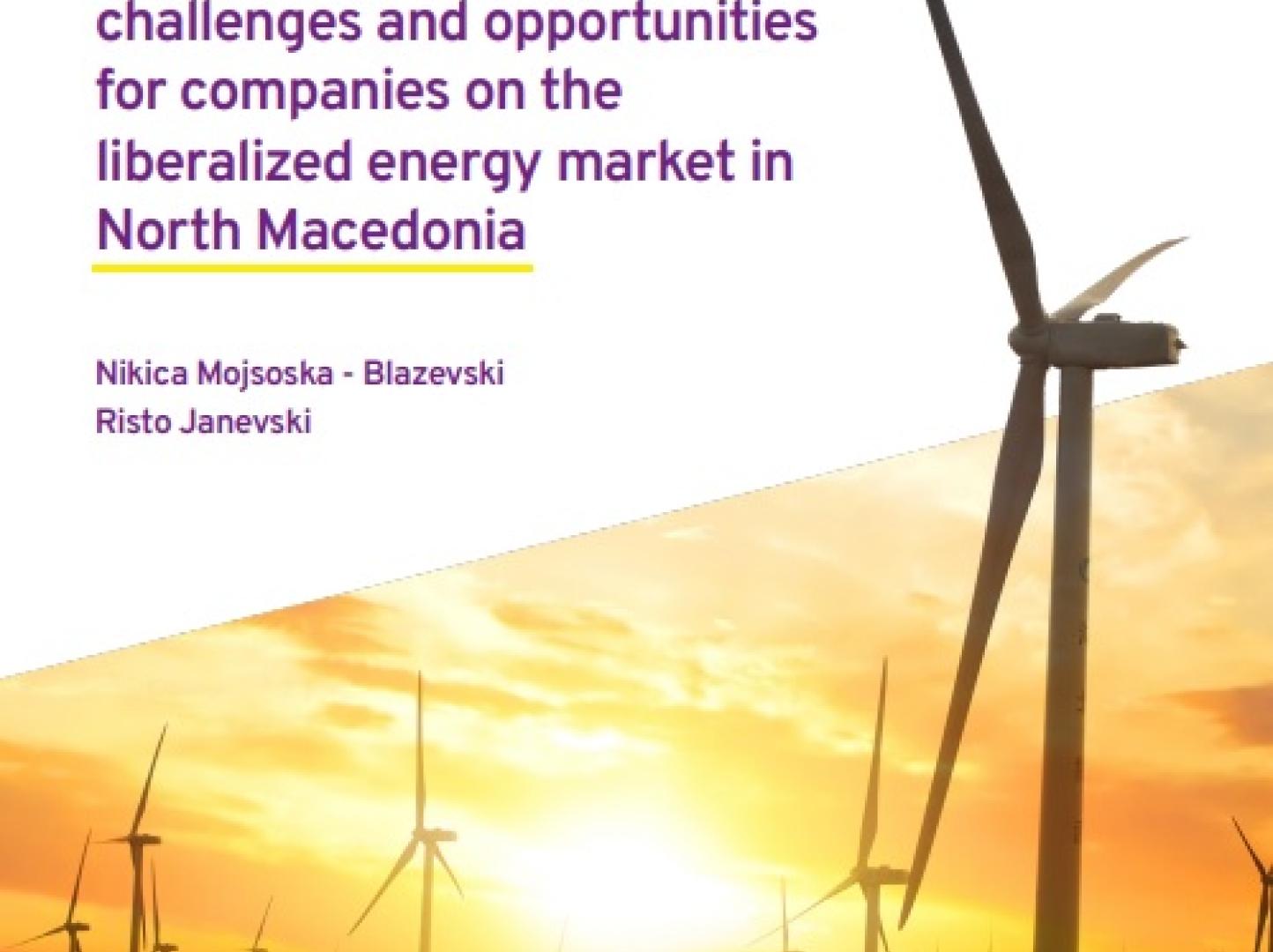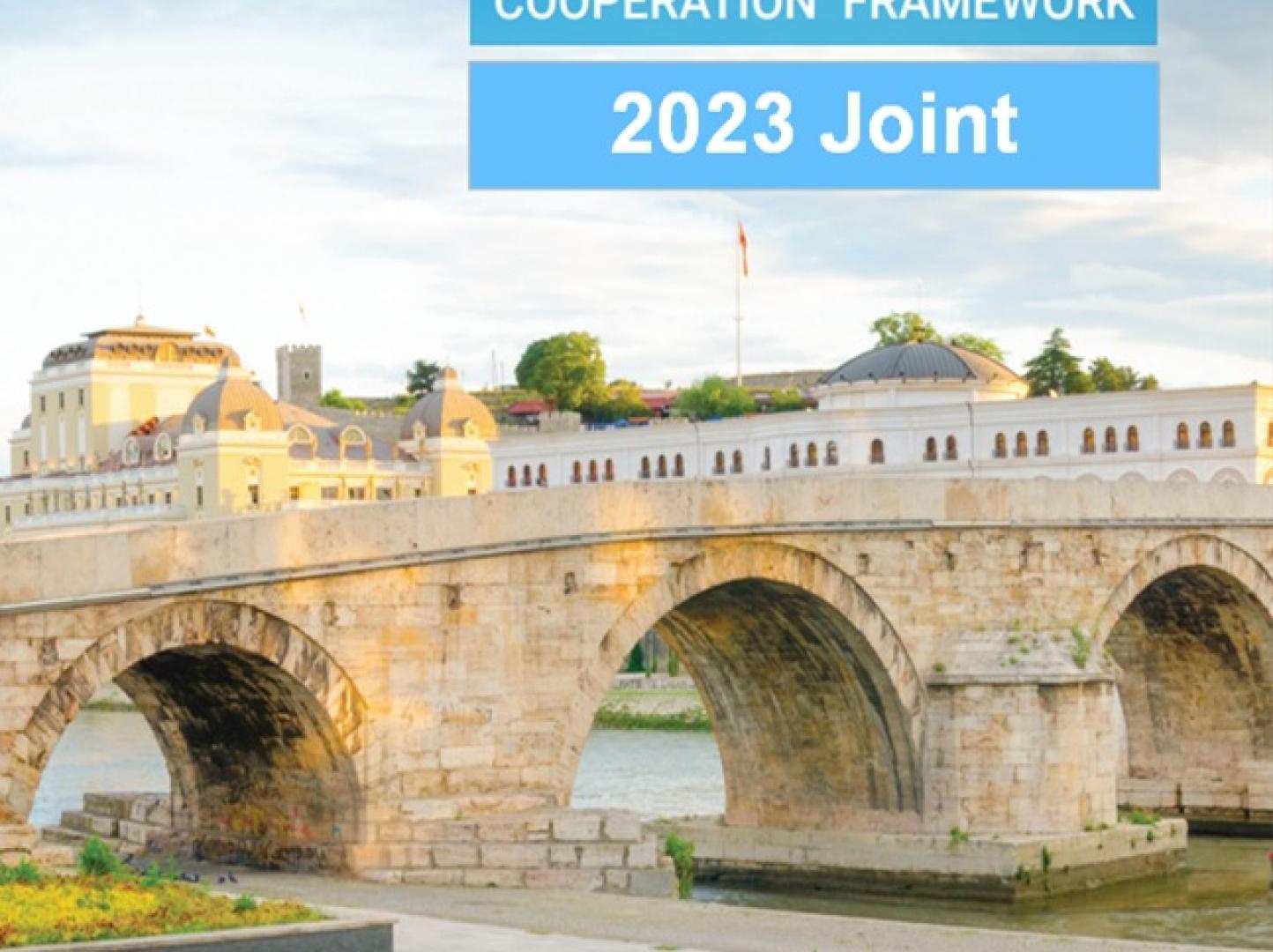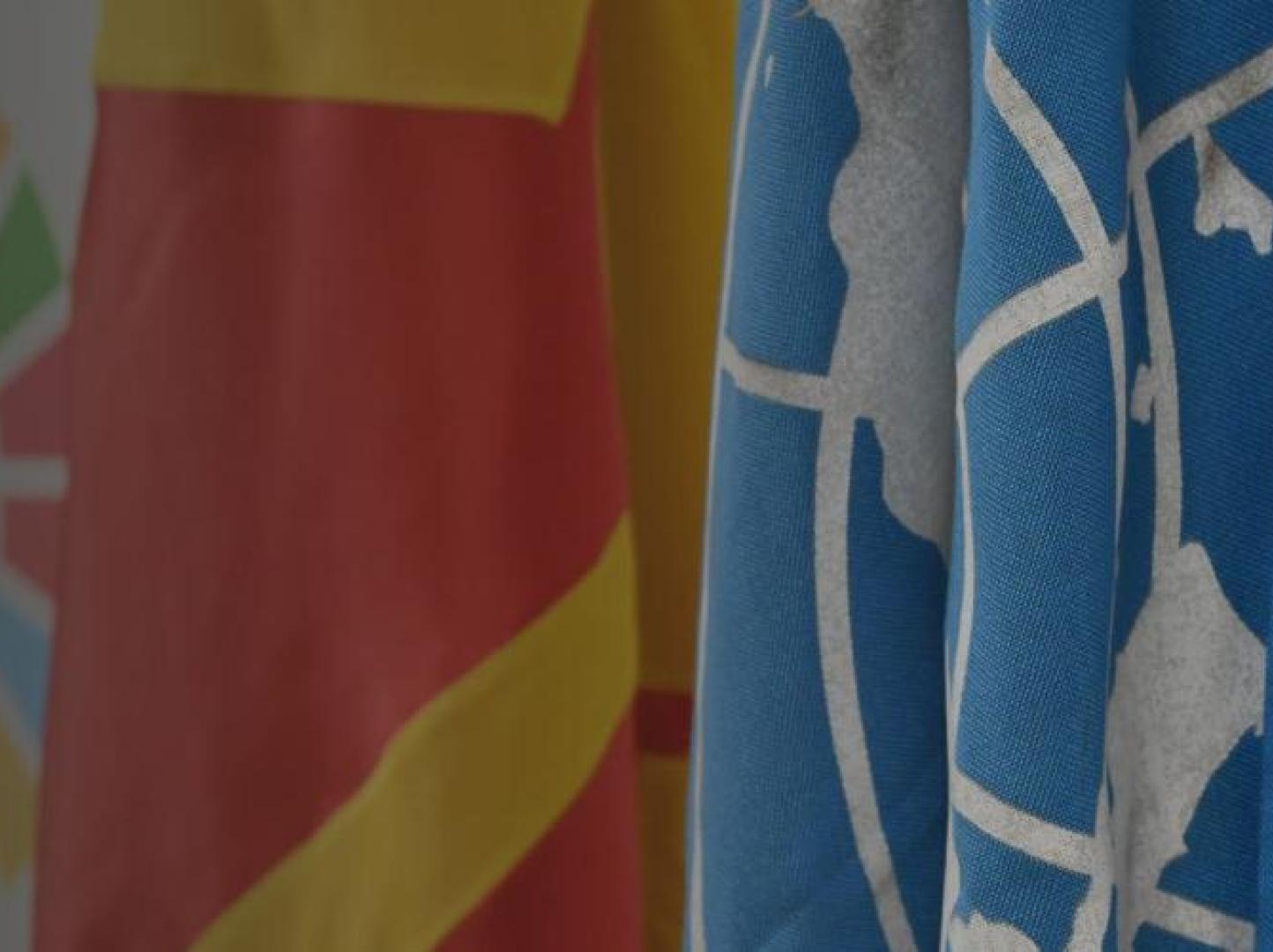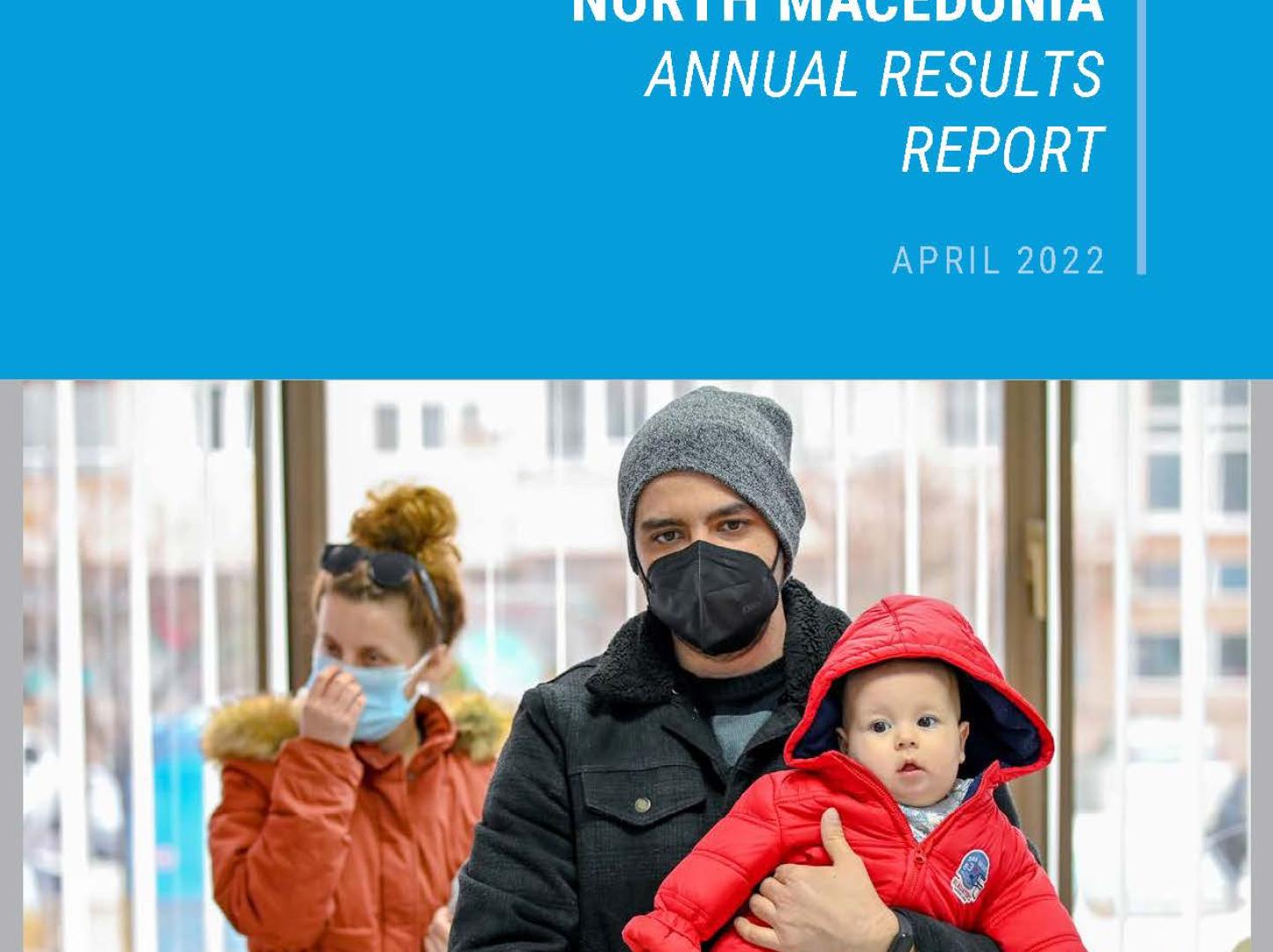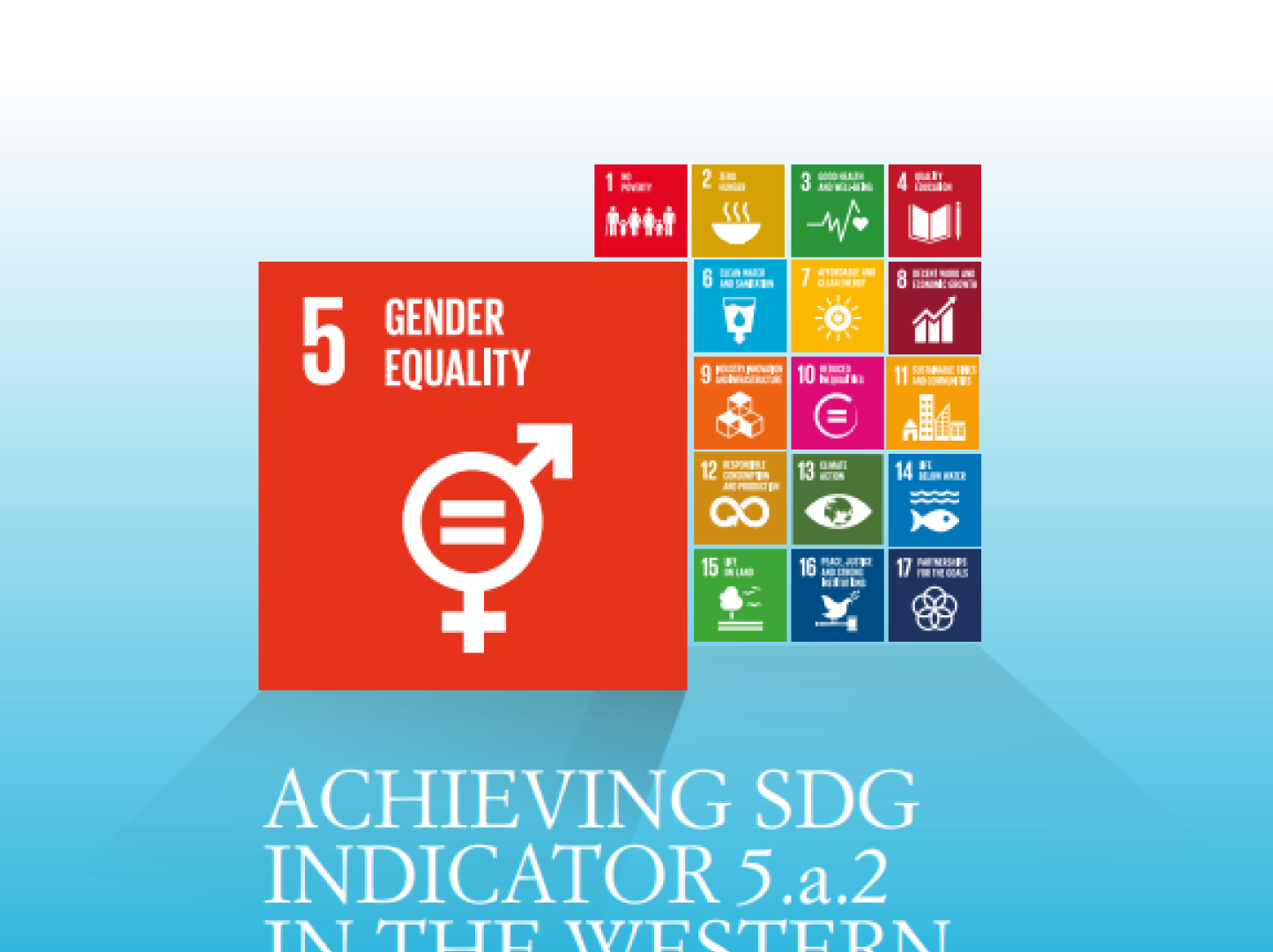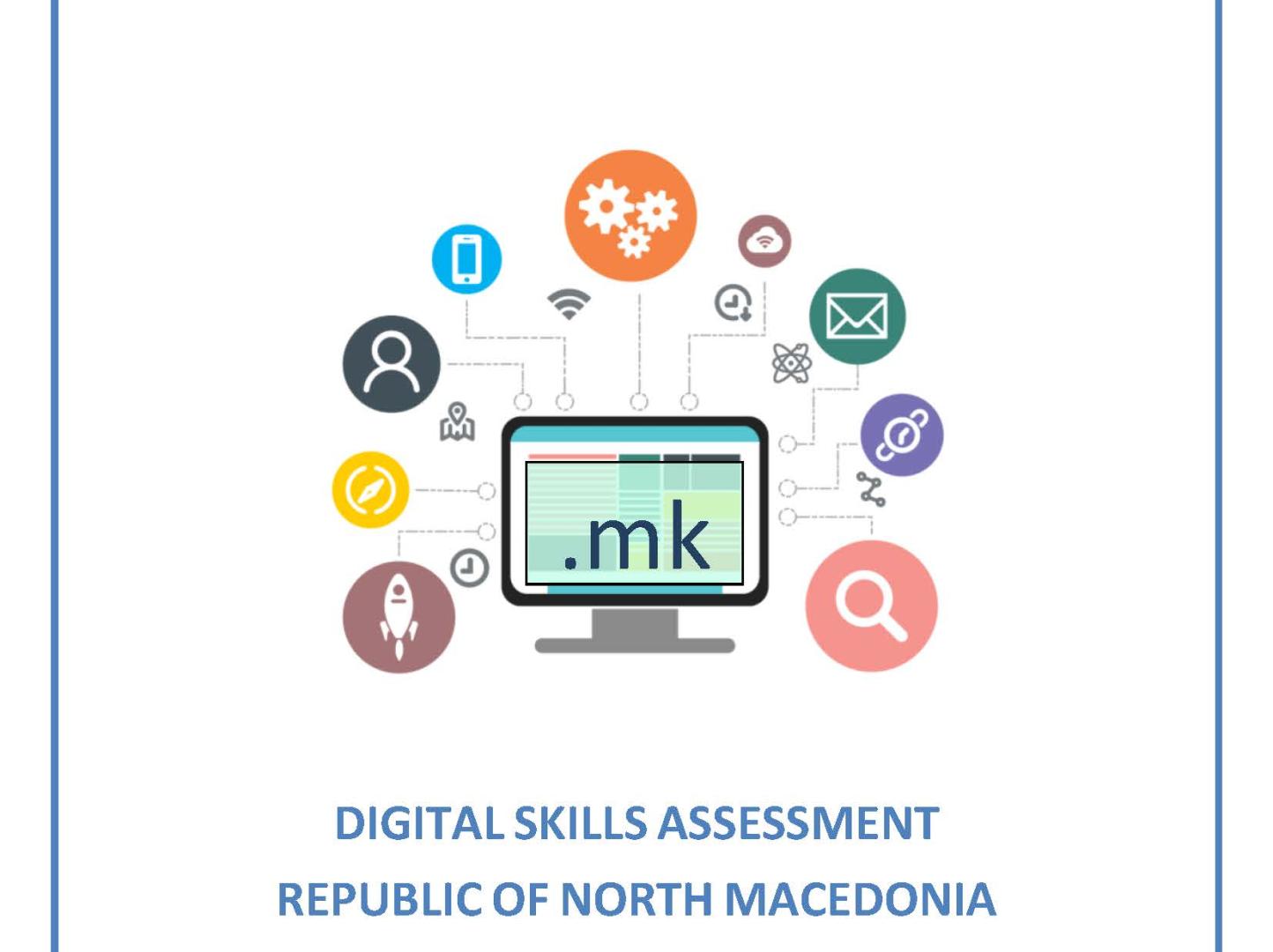Latest
Story
27 June 2024
UNODC World Drug Report 2024: Harms of world drug problem continue to mount amid expansions in drug use and markets
Learn more
Story
27 May 2024
Media can shift the public perception, especially if women are shown in leading roles
Learn more
Story
27 May 2024
Supporting South East Europe regional cooperation for European Union integration
Learn more
Latest
The Sustainable Development Goals in North Macedonia
The Sustainable Development Goals are a global call to action to end poverty, protect the earth’s environment and climate, and ensure that people everywhere can enjoy peace and prosperity. These are the goals the UN is working on in North Macedonia:
Story
27 June 2024
UNODC World Drug Report 2024: Harms of world drug problem continue to mount amid expansions in drug use and markets
Vienna, 26 June 2024: The emergence of new synthetic opioids and a record supply and demand of other drugs has compounded the impacts of the world drug problem, leading to a rise in drug use disorders and environmental harms, according to the World Drug Report 2024 launched by the UN Office on Drugs and Crime (UNODC) today. “Drug production, trafficking, and use continue to exacerbate instability and inequality, while causing untold harm to people’s health, safety and well-being,” said Ghada Waly, Executive Director of UNODC. “We need to provide evidence-based treatment and support to all people affected by drug use, while targeting the illicit drug market and investing much more in prevention.” The number of people who use drugs has risen to 292 million in 2022, a 20 per cent increase over 10 years. Cannabis remains the most widely used drug worldwide (228 million users), followed by opioids (60 million users), amphetamines (30 million users), cocaine (23 million users), and ecstasy (20 million users). Nitazenes – a group of synthetic opioids which can be even more potent than fentanyl – have recently emerged in several high-income countries, resulting in an increase in overdose deaths. Though an estimated 64 million people worldwide suffer from drug use disorders, only one in 11 is in treatment. Women receive less access to treatment than men, with only one in 18 women with drug use disorders in treatment versus one in seven men. In 2022, an estimated 7 million people were in formal contact with the police (arrests, cautions, warnings) for drug offences, with about two-thirds of this total due to drug use or possession for use. In addition, 2.7 million people were prosecuted for drug offences and over 1.6 million were convicted globally in 2022, though there are significant differences across regions regarding the criminal justice response to drug offences. The Report includes special chapters on the impact of the opium ban in Afghanistan; synthetic drugs and gender; the impacts of cannabis legalization and the psychedelic “renaissance”; the right to health in relation to drug use; and how drug trafficking in the Golden Triangle is linked with other illicit activities and their impacts. Drug trafficking is empowering organized crime groups Drug traffickers in the Golden Triangle are diversifying into other illegal economies, notably wildlife trafficking, financial fraud, and illegal resource extraction. Displaced, poor, and migrant communities are suffering the consequences of this instability, sometimes forced to turn to opium farming or illegal resource extraction to survive, falling into debt entrapment with crime groups, or using drugs themselves. These illicit activities are also contributing to environmental degradation through deforestation, the dumping of toxic waste, and chemical contamination. Consequences of cocaine surge A new record high of 2,757 tons of cocaine was produced in 2022, a 20 per cent increase over 2021. Global cultivation of coca bush, meanwhile, rose 12 per cent between 2021 and 2022 to 355,000 hectares. The prolonged surge in cocaine supply and demand has coincided with a rise in violence in states along the supply chain, notably in Ecuador and Caribbean countries, and an increase in health harms in countries of destination, including in Western and Central Europe. Impact of cannabis legalization As of January 2024, Canada, Uruguay, and 27 jurisdictions in the United States had legalized the production and sale of cannabis for non-medical use, while a variety of legislative approaches have emerged elsewhere in the world. In these jurisdictions in the Americas, the process appears to have accelerated harmful use of the drug and led to a diversification in cannabis products, many with high-THC content. Hospitalizations related to cannabis use disorders and the proportion of people with psychiatric disorders and attempted suicide associated with regular cannabis use have increased in Canada and the United States, especially among young adults. Psychedelic “renaissance” encourages broad access to psychedelics Though interest in the therapeutic use of psychedelic substances has continued to grow in the treatment of some mental health disorders, clinical research has not yet resulted in any scientific standard guidelines for medical use. However, within the broader “psychedelic renaissance”, popular movements are contributing to burgeoning commercial interest and to the creation of an enabling environment that encourages broad access to the unsupervised, “quasi-therapeutic” and non-medical use of psychedelics. Such movements have the potential to outpace the scientific therapeutic evidence and the development of guidelines for medical use of psychedelics, potentially compromising public health goals and increasing the health risks associated with the unsupervised use of psychedelics. Implications of opium ban in Afghanistan Following the drastic decrease of Afghanistan’s opium production in 2023 (by 95 per cent from 2022) and an increase in production in Myanmar (by 36 per cent), global opium production fell by 74 per cent in 2023. The dramatic contraction of the Afghan opiate market made Afghan farmers poorer and a few traffickers richer. Long-term implications, including on heroin purity, a switch to other opioids by heroin users, and/or a rise in demand for opiate treatment services may soon be felt in countries of transit and destination of Afghan opiates. Right to health for people who use drugs The report outlines how the right to health is an internationally recognized human right that belongs to all human beings, regardless of a person’s drug use status or whether a person is imprisoned, detained or incarcerated. It applies equally to people who use drugs, their children and families, and other people in their communities. *** ** *** ** For further information, please visit: World Drug Report 2024 homepage
1 of 5

Story
27 May 2024
Supporting South East Europe regional cooperation for European Union integration
The South-East European Cooperation Process (SEECP) stands out as the most comprehensive regional cooperation forum in South East Europe, comprising of 13 participants already members or with integration prospects into European and Euro-Atlantic structures. This forum plays a crucial role in enhancing good-neighborly relations and promoting dialogue across political, security, and economic domains in the region.Through its steadfast commitment to regional coordination and cooperation in EU integration, the United Nations Office for Project Services facilitated the organization of the Skopje meeting of Ministers of EU affairs. The objective was to reaffirm the commitment of participating parties to collaborate in overcoming challenges, seizing opportunities, and translating their shared EU vision into reality, with a focus on accelerating EU integration through regional cooperation.In her address, Michela Telatin, UNOPS RSMCO Director, emphasized UNOPS' role as a steadfast partner in fostering trust and advancing cooperation in South East Europe. She highlighted the agency's support for the Secretariat for European Affairs of the Government of North Macedonia in realizing the forum, underscoring the broader engagement of UNOPS in the Western Balkans to bolster EU integration through project implementation and technical expertise.UNOPS continues its commitment to fostering regional cooperation and EU integration of North Macedonia, Serbia and Montenegro through implementation of several projects aiming to support institutional strengthening and regional cooperation in the EU accession process.
1 of 5

Story
27 May 2024
Media can shift the public perception, especially if women are shown in leading roles
Fatos Grubi, a 30-year-old activist, translator, writer, and journalist from Skopje, North Macedonia, has been at the forefront of advocating for gender equality and human rights. As a writer and journalist at Mollekuqja.mk, he uses his platform to amplify marginalized voices and challenge patriarchal norms in North Macedonia, while encouraging the younger generation to speak up and stand up for their rights. His commitment to promoting gender equality extends beyond writing by his involvement at the Council of Media Ethics of Macedonia (CMEM), where he works to combat hate speech and increase awareness of media ethics with particular attention to women and girls under-representation. Fatos joined the UN Women’s "Imagine" campaign believing in the impact this initiative can have in raising awareness and challenging local gender-based stereotypes in North Macedonia and Western Balkans."I recall talking with a couple of my female friends back in high school and sharing with them how soothing nightly walks along the promenade of the Vardar River in Skopje are. I suggested that they do the same. Their eyes met, and a silent understanding passed between them, a tacit acknowledgment of shared experiences. At that moment, they confided in me, revealing their apprehension about walking alone at night and I became painfully aware of my privilege as a man. This led me to delve deeper and read more into these topics, creating space for my friends to openly talk to me about their experiences in our seemingly same world. Driven by this newfound awareness, I gradually began my activism for gender equality and human rights engaging in vocal advocacy at protests, media appearances, and creative contributions to organizations championing these causes.For a year now, my role as a writer and journalist at Mollekuqja.mk has been instrumental in amplifying marginalized voices and shedding light on critical issues that specific groups of people face in our society. Through my articles, I strive to challenge rigid gender norms by bringing attention to certain aspects of the patriarchal society in North Macedonia, such as the hyper-focus on women's virginity, gender equality in elementary school books, and traditional gender roles in Macedonian and Albanian/Balkan societies.Through my articles and poems, I try to encourage the younger generation to not be afraid when speaking up and standing up for their rights and the rights of others. Voicing their support for gender equality and human rights will help them find like-minded people and create a network that will operate and organize more efficiently than one person on their own. Also, no action is too little, because everyone is good at something. I would tell them to find what their strengths are and how they can utilize them to support the movement that they want to join.My commitment to promoting gender equality extends beyond writing. Since November 2023, I have been employed at the Council of Media Ethics of Macedonia (CMEM), where I work to increase awareness of media ethics and combat hate speech. The experience gained through the media realm has taught me that many challenges greatly impact gender equality in media, the first being under-representation. Creating space for women of all different backgrounds in media can shift the public perception, especially if women are shown in less stereotypical roles and more so in decision-making positions. To those denying sexism or belittling women's struggles: I strive to inform the uninformed but ignore trolls wasting my time.Alongside this hardship, what prevents women from being equally represented in media is the sexism and harassment that they face, scrutiny that men in their respective positions do not experience. There needs to be more support for women when they become targets of these attacks and to prevent this from inhibiting their professional growth. Link: http://unwo.men/7hRc50RgUY4
1 of 5

Story
20 December 2023
UNICEF initiates the development of an experiential learning programme on Air Quality
Written by Jelena Brajovikj
Air pollution levels in North Macedonia and the Western Balkans are breathtakingly high and represent the single greatest environmental threat to human health, with city dwellers breathing air with concentrations of pollutants up to five times higher than levels specified in national, European, and WHO Air Quality Guidance standards.
Children and youth in the region have limited access to environmental education, resulting in a lack of awareness around air quality, the environment and climate-related issues. To address this, UNICEF is implementing a variety of programme activities, supported by Sweden, aimed at improving environment and climate change education, through opportunities for experiential learning.
As part of these initiatives, UNICEF established the Science Learning Network (SLN), a network of six institutions offering a joint educational programme on environment and climate change, aligned with national curricula and verified by the Bureau for the Development of Education. The six members of the SLN are the Macedonian Ecological Society, the Botanical Gardens in Skopje, the Hydrobiological Institute in Ohrid, Galichica National Park, the Educational Centre for Nature Preservation in Negrevo, and Narodna Tehnika – Skopje. Since its soft launch in the spring of 2023, close to 1000 students from across the country have participated in the SLN workshops.
From 20 to 22 December 2023, representatives of the six members of the SLN will convene at a workshop in Mavrovo, to initiate the development of an experiential learning programme on air quality. The programme will build onto the existing programme on environment and climate change and will be offered to schools and students from across the country. The development of the programme is part of a regional partnership between UNICEF and Sweden for Improved Air Quality in the Western Balkans.
1 of 5
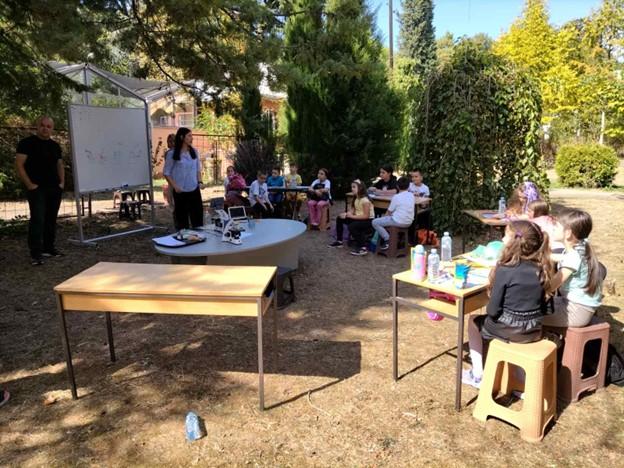
Story
20 December 2023
UNICEF-developed communicator app wins international award
Written by Jelena Brajovikj
The Zero Project initiative identifies and shares solutions that improve the daily lives and legal rights of persons with disabilities. On 4 December, the Zero Project Initiative announced this year’s winners from 523 received nomination from across the globe. The communicator app Cboard was selected as an awardee due to its demonstrated impact, scalability, and innovative character.
Cboard was developed as part of UNICEF’s multi-country initiative “Voice to Every Child”, that combines open-source technologies and capacity development. The app makes it easier for children to communicate using symbols and by turning text and images into speech, allowing children with communication difficulties to access education and thrive in an inclusive setting.
Localized Macedonian and Albanian versions of the app were launched by UNICEF North Macedonia in 2022, in partnership with the organization Open the Windows from Skopje, and the Faculty of Electrical Engineering and Information Technology. The app is currently being used by more than 900 children, parents and professionals at preschools, resource centres and schools, to support children with communication difficulties.
1 of 5
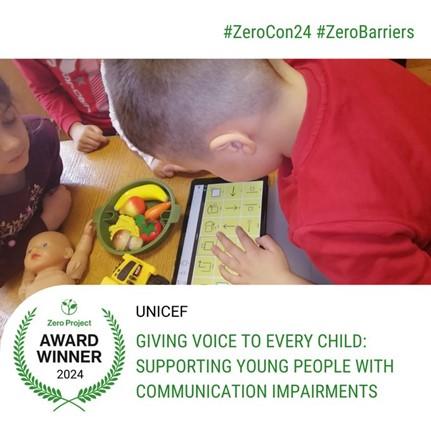
Press Release
16 November 2023
New “green” loan options for underserved SMEs and individuals in North Macedonia
SKOPJE| 3 November 2023| New loan options with Performance-Based Payments (PBP) will be made available to Small and Medium-sized Enterprises (SMEs), targeting groups of creditworthy but underserved individuals/households from North Macedonia to finance their investments in Renewable Energy (RE) and Energy Efficiency (EE) solutions. This was announced at the Green Finance Facility (GFF) Product Launch event today in Skopje, where representatives from the Government of North Macedonia, the United Nations (UN) family, the European Bank for Reconstruction and Development (EBRD), and from commercial banks from the country met to mark this significant milestone in the implementation of the project.
“Considering that all countries are dealing with many challenges, such as the post-covid economic recovery, the economic and energy crisis, I believe that this project with products aimed at small and medium-sized enterprises and individuals from underserved categories is an excellent opportunity to express our strong commitment to accelerating the implementation of the 2030 Agenda and achieving the Sustainable Development Goals“ - said Mr. Fatmir Bytyqi, the Deputy Prime Minister in Charge of Economic Affairs, Coordination of the Economic Departments, and Investments in the Government of North Macedonia.
Sparkasse Banka, ProCredit Bank and Silk Road Bank are the first commercial banks that will provide sub loans to SMEs and target groups for investments in renewable energy and energy efficiency, while the GFF will subsidize 5-30% of the loan principal. PBP loans of this kind are now going to be made available to seven target groups of creditworthy but underserved individuals/households, including female-headed households, single parents, households with people with disabilities, Roma, employees affected by Covid-19, remittance recipients and returning migrants. The investments from both SMEs and the seven target groups of individuals/households are expected to improve and reduce energy consumption, reduce greenhouse gas emissions, and contribute to cleaner air in North Macedonia.
“GFF aims to bring the benefits of green transition to SMEs and groups of society who are usually the last to join and benefit from the green transition, such as single parent households, Roma, households with persons with disabilities, and recipients of remittances. I hope GFF loans will make investments in renewable energy and energy efficiency easier and more affordable for small businesses and homes“ – said Ms. Rossana Dudziak, UN Resident Coordinator in North Macedonia.
The programme is aligned to and supports the achievement of Sustainable Development Goals (SDGs) and the UN Sustainable Development Cooperation Framework (SDCF) targets. It is expected to result in 70,068 MWh of annual energy savings, 80,510 tons of CO2-eq emissions avoided, and 10.7 MW in new renewable energy capacity. Furthermore, enabling access to affordable financing for renewable energy and energy efficiency solutions will contribute to advancements towards SDGs 7 and 13.
The performance-based payment loans will be available starting from 3 November 2023, until the end of 2025 or until the GFF’s financial resources allocated for PBPs have been fully awarded to project beneficiaries. Letters of Agreement with other local partner financial institutions responsible for implementation of performance-based payment (PBP) loans in the country are expected to be signed in 2024.
The "Green Finance Facility" project is implemented by the United Nations Development Programme (UNDP), International Organization for Migration (IOM) and the United Nations Economic Commission for Europe (UNECE), together with the European Bank for Reconstruction and Development (EBRD) as the partner international financial institution, and it is financially supported by the Joint SDG Fund, with co-financing from the Government of North Macedonia.
1 of 5
Press Release
26 July 2023
Call for Participation to Tender for “Construction of hydro meliorative objects and objects for improvement and landscaping of agricultural land in village Dabjani, Municipality of Dolneni”
The EU-funded project “Enhancing Land Consolidation in North Macedonia”, co-funded and implemented by the Food and Agriculture Organization of the United Nations (FAO) has launched a public tender (Reference number: 2023/REUXD/REUTD/122655) for the provision of services for “Construction of hydro meliorative objects and objects intended for improvement and landscaping of agricultural land (gravel access/service roads) in the village Dabjani, Municipality of Dolneni’’.
Activities to be carried out as part of this tender include construction works for enhancement of the agricultural infrastructure in the land consolidation area of Dabjani. More specifically, this will involve both rehabilitation of existing gravel access/service roads and construction of new ones. Additionally, hydro meliorative interventions will be implemented to improve the drainage system, including the construction of passages over existing drainage channels using pipes and tubular culverts.
Potential bidders can be all construction companies registered in the Republic of North Macedonia, which possess at least License B for construction, issued by the Ministry of Transport and Communication of the Republic of North Macedonia.
In order to access the tender documents and submit a proposal, interested companies should first register in the United Nations Global Marketplace (UNGM) portal (www.ungm.org/Vendor/Registration), as only UNGM registered companies are eligible to participate. After successful registration, companies will be able to access the tender documents and submit their proposals through the same UNGM portal (www.ungm.org/Account/Account/Login).
The deadline for submitting an electronic proposal for the tender is 21 August (Monday) 2023, no later than 13:00 hrs, CET.
Background note:
The land consolidation area of Dabjani is situated in the Municipality of Dolneni, approximately 22 km away from the city of Prilep. It is currently the largest ongoing land consolidation project in North Macedonia. The area covers 742 hectares (ha) of agricultural land, with ownership divided between 85 private landowners (435 ha) and the State (307 ha).
A Feasibility Study for Dabjani was conducted in 2019 to assess the potential for land consolidation, examining the agricultural land, landownership and legal issues, conditions of the existing agricultural infrastructure, and the level of interest among landowners to participate in the land consolidation process. The study also confirmed majority-based land consolidation approach which is applied for land consolidation in Dabjani.
After conducting the Feasibility Study, the re-allotment planning was conducted including the design of the necessary agricultural infrastructure interventions within the land consolidation area. The Re-allotment Plan was adopted in January 2022. Through the land re-allotment process supported by the EU-funded MAINLAND project, the number of land parcels in Dabjani has been significantly reduced from 602 to 127 parcels, resulting in regularly shaped parcels with an average size of 5.84 hectares, a substantial increase from the previous average of just 1.23 hectares before the land consolidation process.
In the frame of the EU-funded ‘’Enhancing Land Consolidation in North Macedonia’’ Project, Main Design was prepared for construction of hydro meliorative objects and objects intended for improvement and landscaping of agricultural land (gravel access/service roads) in the village Dabjani.
Construction permit was issued by the Municipality of Dolneni on 13 July 2023 with No. 33-970/11.
About the EU-funded ‘’Enhancing Land Consolidation in North Macedonia’’ Project
Building directly on the results of the MAINLAND project, this project aims to assist MAFWE in further enhancing land consolidation in North Macedonia by improving the national policy on land consolidation, including strategic, legal, and institutional frameworks, as well as to continue supporting the implementation of the National Land Consolidation Programme through a full-fledged implementation of land consolidation projects in two project areas, combined with construction of agricultural infrastructure. The Project budget is EUR 1.2 million, financed from the EU IPA II 2019 Assistance (EUR 1 million) and FAO contribution (EUR 0.2 million). The project will be implemented over a period of 42 months, starting from August 2022 until January 2026.
For more information related to the press release please contact:
Radmila Slavkova, FAO National Communication Specialist
tel: +389 (0)71 21 23 08
e-mail: radmila.slavkova@fao.org
This channel should not be used to obtain clarifications on issues related to the tender itself. Only channels indicated in the tender document should be used for that purpose.
1 of 5
Press Release
13 July 2023
Germany and North Macedonia: UN expert welcomes efforts to repatriate, reintegrate and prosecute nationals returning from Syria and Iraq
GENEVA (13 July 2023) – A UN expert today welcomed the substantial efforts made by Germany and North Macedonia to address the complex situation of their citizens returning from conflict zones, in particular the Syrian Arab Republic, through repatriation, reintegration and prosecution.
“Countries such as Germany and North Macedonia have shown that repatriation is both practical and possible,” said Fionnuala Ní Aoláin, the UN Special Rapporteur on the promotion and protection of human rights and fundamental freedoms while countering terrorism, at the end of a 10-day visit to Germany and North Macedonia.
Ní Aoláin highlighted the dire conditions of mass arbitrary detention in the camps and prisons of North-East Syria, stressing the particularly heinous consequences for vulnerable children who remain detained without access to education, health care, security and other fundamental rights.
“I welcome Germany’s efforts to promote a vibrant and expert civil society engagement in disengagement, deradicalization and reintegration processes, demonstrating the importance of a ‘whole of society’ approach to return and providing a route to human rights compliant, holistic and non-stigmatising reintegration into society,” she said.
The Special Rapporteur noted that North Macedonia has started to develop a model of community-based reintegration based on multidisciplinary expertise, involving social workers, clinical psychologists and security actors, to meaningfully reintegrate families, especially women and children, into their communities.
The expert underlined the importance of prosecutions in accordance with the rule of law for the devastating international crimes committed by ISIL in Syria and Iraq. She welcomed the innovative and unique approach taken by Germany to address core international crimes and the country's apparent willingness to close the immense impunity gap for crimes committed by ISIL.
“I expressly call for the repatriation of men and women from both Germany and North Macedonia to ensure that the return and accountability efforts continue,” she said.
Ní Aoláin said that both countries must continue to be vigilant to ensure that countering violent extremism policies and practices related to return and reintegration are truly human rights compliant. She expressed concern that some reintegration efforts may, in practice, create rather than prevent stigma and exclusion.
“The prosecution and trial of returnees must meet international standards of due process and fairness, sentences must be proportionate and prison conditions must be adequate to ensure that returnees have an equal opportunity for rehabilitation and reintegration into society,” the UN expert said.
The Special Rapporteur welcomed the proactive approach of both Governments to this challenging legal and political issue, which provides a valuable example to other States on how to facilitate the return and reintegration of their citizens from conflict zones, including Syria.
ENDS
Ms. Fionnuala Ní Aoláin was appointed as Special Rapporteur on the promotion and protection of human rights and fundamental freedoms while countering terrorism by the United Nations Human Rights Council. She took up her functions on 1 August 2017. Ms. Ní Aoláin is concurrently Regents Professor and Robina Professor of Law, Public Policy and Society at the University of Minnesota Law School and Professor of Law at the Queens University, Belfast, Northern Ireland. Her mandate covers all countries and has most recently been renewed by Human Rights Council resolution 49/10.
The Special Rapporteurs are part of what is known as the Special Procedures of the Human Rights Council. Special Procedures, the largest body of independent experts in the UN Human Rights system, is the general name of the Council’s independent fact-finding and monitoring mechanisms that address either specific country situations or thematic issues in all parts of the world. Special Procedures’ experts work on a voluntary basis; they are not UN staff and do not receive a salary for their work. They are independent from any government or organization and serve in their individual capacity.
UN Human Rights country page: Germany and North Macedonia
For more information and media requests please contact:
Ms. Karen Reyes Tolosa (+41 76 342 3400; karen.reyestolosa@un.org)
For media inquiries related to other UN independent experts please contact Maya Derouaz (maya.derouaz@un.org).
Follow news related to the UN's independent human rights experts on Twitter @UN_SPExperts
Concerned about the world we live in?
Then STAND UP for someone's rights today.
#Standup4humanrights
and visit the web page at http://www.standup4humanrights.org
Then STAND UP for someone's rights today.
#Standup4humanrights
and visit the web page at http://www.standup4humanrights.org
1 of 5
Press Release
20 February 2023
Joint work key for boosting quality of life for all people in North Macedonia
The members of the Joint Steering Committee discussed the 2022 UN annual results, the opportunities and challenges facing the country, and endorsed the 2023 Joint Workplans.
“Only with joint efforts we can protect humanity and nature, especially if we are committed to the achievement of Agenda 2030, nationally and globally. Full implementation of the Sustainable Development Cooperation Framework is the pathway towards achieving tangible change for people in North Macedonia, resulting in better legal, more efficient and more responsible institutions and greater future for everyone”, said Fatmire Isaki, Deputy Minister of foreign Affairs.
SDCF is a key strategic document that guides the work of UN in North Macedonia and represents the UN development system’s collective offer to support the country in achieving sustainable development goals. To ensure that it reflects the interest and priorities of all people in the country, the SDCF has been developed through a participatory and consultative process, starting with the analysis of the country’s development context, strategic prioritization and its operationalization through annual workplans of UN entities and stakeholders.
“The context has evolved significantly since SDCF’s inception in 2020. COVID-19 and its immediate and long-term socio-economic impact, followed by the current energy, food security and finance crises – all shaped by the war in Ukraine – have put a significant strain on the Government to continue prioritizing reform processes and structural changes as the fiscal space has been shrinking and vulnerabilities increasing,” says Rossana Dudziak, UN Resident Coordinator in North Macedonia. “Targeted and focused expert advice and support, underpinned by the focus on leaving no one behind will remain the key pinnacle of UN work in North Macedonia in 2023 and beyond.”
The 2021-2025 UN SDCF also reflects the UN Secretary General’s plea for accelerated action to implement Agenda 2030 through a Decade of Action.
1 of 5
Press Release
28 December 2022
Systematic solutions as an answer to the global food and energy crisis
Skopje, December 21, 2022. - At the conference entitled "Look further", which was held today in Skopje in the organization of the United Nations, representatives of several UN agencies together with international experts and representatives of the government discussed the key measures that the Republic of North Macedonia is taking and should take plans in the future in order to overcome the challenges in the food and energy crisis.
"The current crisis is in many ways unprecedented. However, the root causes and drivers are neither new nor surprising and reflect our inability to prioritize the advancement of the Sustainable Development Goals. Policy solutions are complex. We need to respond to the immediate needs to lift people out of poverty, but we also need to support businesses in order to save jobs, with concrete measures to ensure the best possible results with the available resources. Most importantly, policies should be systemic, sustainable and visionary to ensure that, despite the challenges, we remain strongly focused on sustainable growth and development. That requires timely and accurate data, cooperation and coordination," said the UN Resident Coordinator, Rossana Dudziak, at the opening of the conference.
During the panel, the Vice Prime Minister for Economic Affairs, Fatmir Bytyqi, emphasized that the problems should be solved systematically. "If they are not solved systematically, the problems increase. For example, we have been talking about digitization for years, but it was only superficial and not essential. Digitization requires a fundamental change in the behavior of stakeholders and citizens. We have not entered any segment to solve the problem in the way we should solve it", says Bytyqi. "Regarding the energy crisis, we understand that production is important, but we knew that we are 35 percent dependent on energy imports. It was nice because the price was good. As soon as a crisis comes, everyone asks why the problem is not solved. That problem is not solved overnight. The problem is again systemic. It should have started to be solved 10 years ago, and that in the field of alternative energies. Green energy. We are now trying to get old timers back into traffic with little intervention. But that is not a solution. The solution is green energy, a transition to green energy," added the Deputy Prime Minister for Economic Affairs.
The deputy representative of UNICEF, Artur Ayvazov, pointed out that shocks from price growth disproportionately affect households with more children and poorer families, due to their lower incomes and the greater share of food and energy consumption in their household budgets. Rising food prices leave these families with very little means to meet other basic needs. Ayvazov indicated that the Government should consider additional measures to reduce the burden on children and other vulnerable groups, including by expanding the access and volume of existing cash transfers and to ensure that the budget crisis does not disrupt basic health care services. , social protection and education.
Addressing the conference, the Deputy Regional Representative of FAO for Europe and Central Asia, Nabil Gangi, emphasized that from a long-term perspective, it is important to consider the structural causes of the food crisis, and in order to have a better approach to solving this problem, distinguishes between issues affecting access to food and issues affecting food availability. In terms of access to food, the situation is multidimensional and reflects the complex interrelationship between food, energy and financial crises. According to Gangi, addressing food security challenges caused by current crises requires an "agri-food systems" approach, which FAO promotes to act outside the usual sectoral frameworks. It is a systematic combination of policies, investments and solutions focused on sustainable improvements in productivity and efficiency, greater resilience and ensuring enough healthy food for all.
"Empirical research shows that a well-developed financial system can increase growth by up to 1 percent, and more importantly, reduce poverty. Financial systems contribute to encouraging savings and channeling them into investments, which are important for increasing the volume of capital and productivity, which in turn are the main determinants of long-term growth," said the Governor of National Bank of the Republic of North Macedonia, Anita Angelovska - Bezhoska. "The importance of finance is especially great in these crisis circumstances that emphasize structural weaknesses and the need for a green and digital transformation of the economy. It is positive for us that credit support for green transformation is growing, i.e. loans for this purpose in the past three years have recorded an increase of 80%", says Angelovska - Bezhoska.
According to the Permanent Representative of the UNDP, Armen Grigoryan, the crisis will probably continue in 2023 and it is difficult to predict in which direction things will develop. "UNDP and other UN agencies in the country, together with other development partners, are here to support institutions and citizens and contribute to public dialogue and consensus building around specific policies and other measures that will contribute to addressing current development challenges and the impact of the global crisis. However, we now have a better understanding of the vulnerabilities and root causes of the crisis, internal and external factors, and propose systemic pathways in response to the crisis. One of the things that should be paid attention to is the gray economy, which, according to research, amounts to somewhere around 35 percent entering the system, to pay taxes. The second thing is the encouragement of small and medium-sized enterprises and regional cooperation," Grigoryan said.
The Minister of Finance, Fatmir Besimi, emphasized that the past three years, which have been marked by crisis, have moved the mid-term framework of the planned fiscal targets, aimed at the consolidation of public finances and their long-term sustainability. "But at the same time, the policy makers give us the opportunity and show us where in the system we need changes. That's why we think it's good to implement the reform agenda in crisis episodes."
He added that this year, contrary to expectations, was not a year suitable for fiscal consolidation, and there was a need for measures to support citizens, the economy and for greater production of electricity from domestic capacities to deal with the energy and price crisis.
"In these conditions, the Government successfully resorted to rationalization of the expenditure side of the Budget, with which the achieved deficit is largely kept within the framework of the fiscal targets, which by 2027 should be reduced to 2.8% of the GDP budget deficit and public debt below 60%", said Besimi.
The goal of the United Nations agencies, UNDP, FAO and UNICEF, together with national and international partners, is to find sustainable and long-term solutions that will respond to the needs of vulnerable groups and at the same time support growth and development, in conditions of high inflation. and modest financial resources.
1 of 5
Latest Resources
1 / 11
1 / 11



